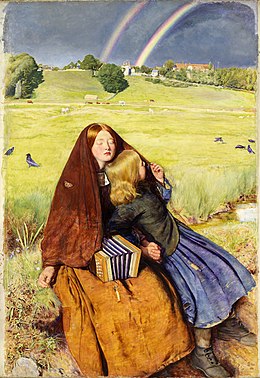
Back عيارة Arabic Tuláctví Czech آوارگی FA Irtolaisuus Finnish Vagabondage French 부랑자 Korean Vagabundagem Portuguese Бродяжничество Russian Бродяжництво Ukrainian Lang thang VI
The examples and perspective in this article deal primarily with Europe and the United States and do not represent a worldwide view of the subject. (November 2022) |

Vagrancy is the condition of wandering homelessness without regular employment or income. Vagrants[a] usually live in poverty and support themselves by travelling while engaging in begging, scavenging, or petty theft. In Western countries, vagrancy was historically a crime punishable with forced labor, military service, imprisonment, or confinement to dedicated labor houses.
Both vagrant and vagabond ultimately derive from the Latin word vagari, meaning "to wander". The term vagabond and its archaic equivalent vagabone come from Latin vagabundus ("strolling about"). In Middle English, vagabond originally denoted a person without a home or employment.[2]
- ^ "Vagrant – Definition of vagrant in English by Oxford Dictionaries". Oxford Dictionaries – English. Archived from the original on 1 March 2020.
- ^ Definition of vagabond from Oxford Dictionaries Online
Cite error: There are <ref group=lower-alpha> tags or {{efn}} templates on this page, but the references will not show without a {{reflist|group=lower-alpha}} template or {{notelist}} template (see the help page).
